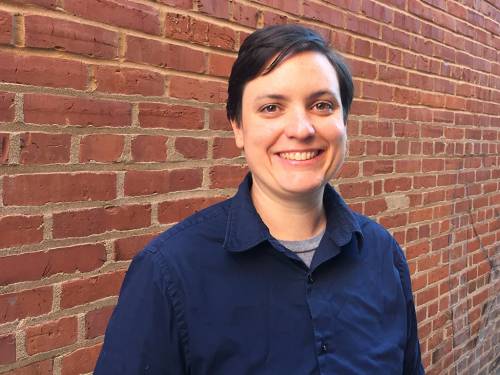A vulnerable moment stands out during ‘Vital Conversations’ webinar
by Mike Ferguson | Presbyterian News Service

The Rev. Shanea D. Leonard speaks to the Presbyterian delegation to the United Nations Commission on the Status of Women in March 2019. (Photo by Rich Copley)
LOUISVILLE — One moment emerged above all the others Wednesday during a “Vital Conversations” webinar hosted by the Presbyterian Mission Agency’s Office of Vital Congregations.
While discussing how it feels to enter a room full of white people, the Rev. Shanea D. Leonard, the Presbyterian Church (U.S.A.)’s associate for Gender & Racial Justice, talked about scanning the room for a person of color to chat with. Sometimes the search produces no one.
“Then I immediately feel scared,” Leonard said. “I don’t know who believes what in that room. It’s the same fear I feel when the police are in my presence, and I shouldn’t feel that way. That’s what’s behind this idea of my life mattering.”
“This is an important moment to take in what Shanea is saying and incorporate it into what we know is true,” said Mel Tubb, mission specialist for loan repayment assistance in Financial Aid for Service. “If you feel anything but compassion and care for Shanea, you need to root that out. Any tiny voices you hear while Shanea is pouring out that vulnerability to us, that’s what we need to root out. That’s the work.”
Leonard and Tubb were the guests for this week’s “Racism and Reconciliation” conversation, attended by nearly 40 participants, most of whom are enrolled in the Vital Congregations Initiative. The Rev. Carlton Johnson, associate for Vital Congregations, asked the guests questions to get the discussion going, including how they’d respond to Audre Lorde’s quote, “For the master’s tools will never dismantle the master’s house.”
“We use the master’s tools in our everyday life, in a system built for white people to push everyone else down,” Tubb said. “Movements away from that are ways that we are dismantling racism.”

Mel Tubb is a mission specialist for loan repayment assistance with Financial Aid for Service. (Contributed photo)
“As a white person,” Tubb said, “every day, every minute, every action I take — I have to decide to be anti-racist … Our systems aren’t broken. They are doing what they are designed to do — to raise up white people and push everyone else down.”
The way many Presbyterians and other Christians worship, Leonard said, is “based on a Eurocentric white way of being. How do we lift up other cultures? We parade people in front of ourselves and say we have diversity. Who do we lift up as scholars? More than likely, it’s a lot of dead white men. We think no one else has any theological reflections at all, and that’s far from the truth.”
“In white spaces,” Tubb said, “you will hear something racist. When we are alone together with our white people, it happens a lot — coded language for bad communities or bad schools. That’s racism, and it’s our job to call that out and say why that’s not OK … We have to work every minute of every day to earn that trust back, and the onus is on us white people 100 percent.”
“Racism is different in this country than anywhere else because of the history of forced migration through chattel slavery, and the forced elimination of Indigenous people,” Leonard said. “You can’t be a racist if you don’t control the dominant power structure. It’s up to white folks to dismantle it because it’s a tool white folks created. Use your privilege,” Leonard suggested, “to disarm what harms your fellow human beings.”
“Proclaiming that Black lives matter is the most counter-cultural, gospel thing you can do,” Tubb said. “It’s not tolerance. It’s denying ourselves and giving up things about ourselves for another. That’s the gospel.”
Johnson read the Parable of the Lost Sheep from Luke 15:1-4 and asked the guests to discuss their interpretations.
“What if the sheep is not lost, but is just tired of sheeping as usual — living in a pen and seeking to forge its own way?” Leonard asked. “Sometimes different from the norm is OK. When things are falling apart, sometimes they’re falling into place … Maybe that’s what needs to happen. We need to leave the flock and forge a new way in which God is with us, to go into the world and preach the gospel, to be salt and light in a world that’s lost.”
“White people probably need to think about how comfortable and lovely it is in the fold,” Tubb said. “I grew up learning that the lost sheep is stupid and deserves what it gets. But I don’t think that fits the gospel. Instead of being safe and happy in our pen, what would it be like to follow that sheep and be uncomfortable?”
“We as white people are quick not to do things because we say we will be attacked,” Tubb said. “A conversation with our uncle at the dinner table may make us uncomfortable, but he’s not going to injure us. We need to be OK with being uncomfortable.”
![]() You may freely reuse and distribute this article in its entirety for non-commercial purposes in any medium. Please include author attribution, photography credits, and a link to the original article. This work is licensed under a Creative Commons Attribution-NonCommercial-NoDeratives 4.0 International License.
You may freely reuse and distribute this article in its entirety for non-commercial purposes in any medium. Please include author attribution, photography credits, and a link to the original article. This work is licensed under a Creative Commons Attribution-NonCommercial-NoDeratives 4.0 International License.